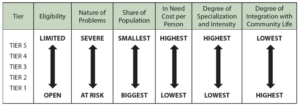PEI Mental Health and Addictions Plan (Prince Edward Island)
Posted by CDR Help Desk on Aug 23, 2018 in Blog | 0 comments

The PEI mental health and addictions 10-year plan was developed only a few years ago and covers 2016 to 2026. The document, Moving Forward Together, Prince Edward Island’s Mental Health and Addictions Strategy has five main pillars: mental health promotion for people of all ages; access to the right service, treatment, and support; an innovative and collaborative workforce; invest early – focus on children, young people and families, foster recovery and well-being for people of all ages.
Mental Health Promotion for People of All Ages
The priorities the committee has outlined to accomplish this pillar are relatively general. Mental health promotion and illness prevention activities and programs are to be implemented for people of all ages at multiple levels of government and community organizations. There are a few specifics like implementing the National Standard for Psychological Health and Safety in the Workplace. Although, there doesn’t seem to be any specifics about what kind of promotion and prevention activities will be implemented and how they will help accomplish the priority.
Access to the Right Services, Treatment, and Support
To address wait times and access to services the committee is proposing an evidence-based model that is used in other countries like the UK, Australia, and NZ. This “Tiered Model” helps with planning, and organization and delivery of treatment and services. As you can see in the below diagram, this tiered approach to care is designed to provide the most appropriate and least intrusive services for patients and only step up to the next level as required. The committee has noted however that in tiers 3, 4, and 5 crucial infrastructure and services are missing to make this Tiered Model a reality. Tier 3 still needs therapeutic group homes and mental health urgent care, tier 4 calls for adult day treatment that is not available, and tier 5 requires a secure care unit which PEI does not have. These are all critical pieces of care infrastructure that are necessary for a functioning mental health and addictions system and need to be addressed immediately if any of their other goals are to be achieved. However, PEI only has a population of 150 000 and it can be hard to invest in large structures when realistically they won’t be accommodating a huge amount of people.
An Innovative and Collaborative Workforce
PEI has a shortage of mental health workers at all levels ie. psychologists to social workers to carers in group homes. In this plan, they are hoping to not only recruit more workers but also train and educate workers in core clinical competencies and evidence-based care.
Invest Early – Focus on Children, Young People, and Families
The committee acknowledges that 70% of mental illnesses develop before the age of 25. Their priorities are to help young people manage their mental health include closing service gaps, build capacity in primary care, and encourage more community programs and services.
Foster Recovery and Well-being for People of All Ages
This plan supports the notion of the mental health and addiction system being recovery-oriented. This is an evidence-based method of getting patients both the acute and long-term care they need.
Conclusion
The committee acknowledges that much of its plans for the future are not based on new ideas, but rather they are evidence-based and reflect what was found out during consultations. PEI is a small province with unique challenges. The plan is not necessarily ground-breaking but there are many good first steps outlined in this document. This action plan will be updated every two years, so when the 2018 update is published you will be able to read about it here. If you live in PEI and are looking for recovery options, including drug rehab and alcohol treatment programs in Prince Edward Island, please call our specialist for help.
References:
JMC – 2018.07.25
The post PEI Mental Health and Addictions Plan (Prince Edward Island) appeared first on Canada Drug Rehab.




